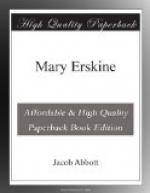That night Mr. Keep asked his son what he thought of lending Mr. Gordon two or three hundred dollars. His son said doubtfully that he did not know. He was somewhat uncertain about it. Mr. Gordon was doing very well, he believed, but then his expenses were quite heavy, and it was not quite certain how it would turn with him. Mr. Keep then said that he had two or three hundred dollars on hand which he must dispose of in some way or other, and he asked his son what he should do with it. His son recommended that he should offer it to Albert. Albert formerly lived at Mr. Keep’s, as a hired man, so that Mr. Keep knew him very well.
“He is going on quite prosperously in his farm, I understand,” said the doctor. “His land is all paid for, and he is getting quite a stock of cattle, and very comfortable buildings. I think it very likely that he can buy more stock with the money, and do well with it. And, at all events, you could not put the money in safer hands.”
“I will propose it to him,” said Mr. Keep.
He did propose it to him that very afternoon, for it happened that Albert went to the village that day. Albert told Mr. Keep that he was very much obliged to him for the offer of the money, and that he would consider whether it would be best for him to take it or not, and let him know in the morning. So he told Mary Erskine of the offer that he had had, as soon as he got home.
“I am very glad to get such an offer,” said Albert.
“Shall you take the money?” said his wife.
“I don’t know,” replied Albert. “I rather think not.”
“Then why are you glad to get the offer?” asked Mary Erskine.
“Oh, it shows that my credit is good in the village. It must be very good, indeed, to lead such a man as Mr. Keep to offer to lend me money, of his own accord. It is a considerable comfort to know that I can get money, whenever I want it, even if I never take it.”
“Yes,” said Mary Erskine, “so it is.”
“And it is all owing to you,” said Albert.
“To me?” said Mary Erskine.
“Yes,” said he; “to your prudence and economy, and to your contented and happy disposition. That is one thing that I always liked you for. It is so easy to make you happy. There is many a wife, in your situation, who could not have been happy unless their husband would build them a handsome house and fill it with handsome furniture—even if he had to go in debt for his land to pay for it.”
Mary Erskine did not reply, though it gratified her very much to hear her husband commend her.
“Well,” said she at length, “I am very glad that you have got good credit. What should you do with the money, if you borrowed it?”
“Why, one thing that I could do,” said Albert, “would be to build a new house.”
“No,” said Mary Erskine, “I like this house very much. I don’t want any other—certainly not until we can build one with our own money.”




